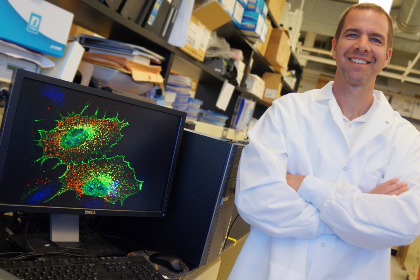August 3, 2022 by
Janet L. Essman Franz
Jason Botten, Ph.D., professor of medicine and associate director of the Vermont Biomedical Research Network, received a University of Vermont SPARK-VT grant to help commercialize his work to develop broad-spectrum antiviral therapeutics, following a faculty pitch competition held in June 2022.

Jason Botten, Ph.D., UVM Larner College of Medicine professor, in his lab next to a computer displaying cells infected with a virus.
Jason Botten, Ph.D., professor of medicine and associate director of the Vermont Biomedical Research Network, received a $45,000 University of Vermont SPARK-VT grant to help commercialize his work and move it a step closer to the marketplace, following a faculty pitch competition held in June 2022.
The SPARK-VT grant supports Botten's work to develop broad-spectrum antiviral therapeutics by targeting the human protein ERGIC-53 with small molecules. This work follows Botten's patented discovery that the host protein, ERGIC-53, though nonessential for human health, is critically required for several families of pathogenic RNA viruses to complete their life cycle. Botten, along with former Cellular, Molecular and Biomedical Sciences graduate student Joseph Klaus, Ph.D., and Professor Anne Mason, Ph.D., were granted a U.S. patent describing a strategy to target ERGIC-53 to create a broad-spectrum antiviral drug. This drug could be used to combat several families of RNA viruses, including coronaviruses, arenaviruses, and filoviruses.
One path of Botten's development of a broad-spectrum antiviral will be done in collaboration with Atomwise Inc., which will use their world-leading artificial intelligence AtomNet® technology to identify the compounds for the antiviral drug screen. Atomwise chose Botten's project through a competitive process and, as a result, his team was selected to receive an Atomwise Artificial Intelligence Molecular Screen (AIMS) award. The AIMS award supports promising non-profit researchers with resources to help advance their work to find solutions for complex health conditions. The SPARK-VT award will help fund the Botten lab to screen the compounds identified by Atomwise.
Botten has also partnered with Celdara Medical to raise a different class of antiviral molecules targeting ERGIC-53. This work is supported by a $600,000 National Institutes of Health (NIH) Phase I Small Business Technology Transfer (STTR) award.
At the annual SPARK-VT competition, UVM faculty pitch their commercialization ideas to a panel of leaders from biotech, pharmaceutical, business, engineering, finance and legal fields. Panel members ask questions, challenge presenters on the details of their plans and offer suggestions, and then deliberate in private before announcing the winning teams, who receive an award.
Botten previously received SPARK-VT awards in 2017 and 2018 to develop potent neutralizing antibody therapies against Sin Nombre and Andes viruses, both of which cause hantavirus cardiopulmonary syndrome (HCPS) in the Americas. Botten, in partnership with Celdara Medical, received an additional $1.2 million from NIH via a pair of awards to continue developing these antiviral strategies.
Research in the Botten laboratory focuses on understanding pathogenic RNA viruses, which spread to humans from rodents and insects. The research aims to discover key virus-host interactions that can be targeted for developing therapeutics and vaccines. Several of these discoveries have translational relevance and Botten has assembled an international team of top industry and government partners, as well as clinicians and basic researchers, to advance these inventions.
During the past year, Botten also received two additional patents and funding for the following inventions:
· A novel means to convert virulent arenaviruses into live attenuated vaccines: Botten's team, including former Cellular, Molecular and Biomedical Sciences graduate student Christopher Ziegler, Ph.D., and former postdoc, now Assistant Professor of Microbiology and Molecular Genetics Emily Bruce, Ph.D., discovered novel host and viral determinants that drive the production of a special class of viral particles called defective interfering (DI) particles. Theoretically, the more DI particles a virus produces, the less virulent it will be. Their invention takes advantage of these discoveries such that they hope to engineer a virus to overproduce DI particles, which should attenuate the virus. In addition to this patent, Botten’s team will be receiving a $3 million NIH R01 grant to understand the role of DI particles in protecting host fitness and define the mechanisms by which they are produced.
· A method for targeting threonyl tRNA synthetases to treat various human diseases. This work came out of the Christopher Francklyn, Ph.D., laboratory, where researchers determined that threonyl tRNA synthetase helps regulate a pathway used by invasive cancers to induce angiogenesis — the formation of new blood vessels that sustain their growth.